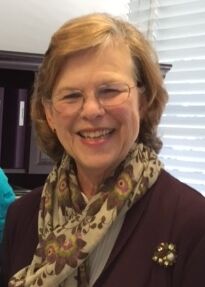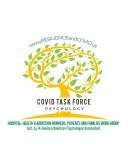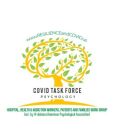Health
COVID Is Not the Only Public Health Problem Facing America
Substance use is increasing, with drastic consequences for children.
Posted January 1, 2021 Reviewed by Ekua Hagan
Guest post by Rosemary Tisch
“We should be very worried,” states Dr. Jack Shonkoff, Director of Harvard University’s Center on the Developing Child1:
- The risk for child abuse increases during economic crises.
- Parental job loss due to the pandemic can have negative consequences on young children, including increased risk for psychological and physical abuse at the hands of their parents2.
- Emergency Room doctors are reporting more severe abuse cases3, although child maltreatment reports are down.
- National sales of alcohol are increasing: 54% for a week ending 3.21.20; while online sales increased 262% from 2019!4
When parents use alcohol and other drugs, kids suffer. The recent PBS special, "Invisible Scars," addresses childhood trauma which leads to mental and physical health problems as adults.

Childhood trauma, also referred to as Adverse Childhood Experiences or ACEs, cluster around substance use in the family5. Many years ago, mine was one of these families.
I was using alcohol in a downward spiral. I didn’t know what to do, with two daughters ages 4 and 8 — one suffering from significant learning differences.
With family support and resources, I was able to get help and learned skills to deal with stress without alcohol.
But not everyone has access to this level of support or help, especially not during the pandemic.
Addiction runs in families — often for many generations. So, parents are likely children of people with substance use disorder, too. My grandfather died drunk, homeless on the streets of LA.
As I learned about the future my children were likely to have — their own addiction, mental and physical health challenges — I swore to break this cycle and to share what I had learned with others:
- We need to provide coaching, offer alternatives, and avoid telling participants what to do.
- Punitive approaches and shaming don’t work.
- We must respect and collaborate with families, validating their experiences without judgment or discrediting statements.
The outcome of my quest was Celebrating Families! (CF!) — an evidence-based, family skill-building program for families dealing with substance use disorders.
CF! began back in the early 1990s, when a daughter of one of my Episcopal priests died of a prescription drug overdose.
Her family asked me to create a school-based prevention program for our local high school, which would address alcohol, legal and illegal drugs, called SCRIPTS.
Then a group working on a prevention curriculum for schools in Moscow, Russia, heard about this and asked us to develop a program for them.
This was followed in 2001 by Judge Leonard Edwards, Supervising Judge of the Santa Clara, CA Juvenile Dependency Courts (now retired), hearing of our work in Russia and saying, “I want that program for my families.”
Early evaluation by SAMHSA evaluators was outstanding.
One of the families named the program when they said, “This is not another parenting program…this is about celebrating my family!”
The curriculum, distributed by the National Assoc. for Children of Addiction, has adaptations for Native American and Spanish-speaking families, as well as families with children, from birth through three years of age.
Celebrating Families! is a successful program6,7, loved by children and families, meeting the needs of families who are hurting. These strategies can be used by other professionals working with families by helping them to:
1. Feel safe
Reassure children that grown-ups are working really hard to protect them.
Encourage parents to tell children they are loved. Help families to be free from violence, threats of violence, and substance use.
Embolden families to have age-appropriate conversations about what’s happening.
Help families learn how to create their own solutions.
2. Learn ways to deal with stress
Helping parents learn the importance of healthy living skills for themselves and their children, such as exercise and deep breaths, which are released very slowly. Learn the importance of providing quiet times, taking walks outside in nature, turning off the news (TV, radio, internet).
3. Be nurturing and have a consistent routine
Parents may not understand the importance of loving, respectful touch, nor the need for a consistent routine for meals, sleep, learning, and play. When times are uncertain (like now), routines are even more important.
4. Recognize and talk about problems
Children need to know they did not cause, cannot cure, and cannot control family or adult problems.
5. Identify someone they can talk with
Everyone (children, parents) needs a “safe person” for support, nurturing, help, and safety. Having just one person can make a difference.
6. Model being calm
Remember your own self-care.
Punitive approaches and shaming don’t work.
Parents who view hardships as something they can overcome are less likely to physically abuse their children, even if they lose their jobs.8
Hope is possible – encourage parents to get help for their alcohol and drug use; talk about what’s happening; and coach families in learning basic healthy living skills. Skills such as those that are taught in Celebrating Families!
Some resources:
- National Association for Children of Addiction
- Helping Children During the Coronavirus May Look Different
- Child Help National Abuse Hotline at 1-800-4-A-CHILD or 1-800-422-4453
- Guidance on communicating with children about COVID-19
- The National Child Traumatic Stress Network
- Listing of child abuse and neglect reporting toll-free numbers by state

Rosemary Tisch is the author of numerous substance abuse prevention curriculums for children and families and has conducted trainings throughout the world. She was lead author for Celebrating Families! and supervised its adaptation for families with young children (0-3) and for monolingual Spanish families. Honors include: 2015 Hope Tribute at 3rd Annual Miracles Breakfast for advocating for children and adolescents affected by chemical addiction and co-occurring disorders; the 2012 Vernon Johnson Award from Faces & Voices of Recovery; the 2011 Ackerman/Black Award from NACoA; the 2010 California State Director’s Award for Cultural Diversity. She is married with two grown daughters and four granddaughters, ages 3-13.
References
1. Santhanam, L. (2020, Dec. 16). How to help kids build resilience amid COVID-19 Chaos. PBS Newshour. Retrieved 12.10.20 from https://www.pbs.org/newshour/health/how-to-help-kids-build-resilience-amid-covid-19-chaosretrieved 12.10.20.
2. Wright, I. and Cody, A. (2020, Dec. 2). Experts study effects on families of parental job loss during pandemic. UTSA Today (University Strategic Communications), The University of Texas at San Antonio. Retrieved 12.10.20 from https://www.utsa.edu/today/2020/12/story/covid-parental-job-loss-research.html.
3. Schmidt, S., Natanson, H., (2020, April 30). With kids stuck at home, ER doctors see more severe cases of child abuse. Washington Post. Retrieved 12.10.20 from https://www.washingtonpost.com/education/2020/04/30/child-abuse-reports-coronavirus/.
4. Pollard, M., Tucker, J., Green, H., (September 29, 2020). Changes in Adult Alcohol Use and Consequences During the COVID-19 Pandemic in the US. JAMA Network Open. Retrieved 12.29.20 from https://jamanetwork.com/journals/jamanetworkopen/fullarticle/2770975
5. Felitti, V. J. (2003). The Origins of Addiction: Evidence from the Adverse Childhood Experiences Study Kaiser Permanente Medical Care Program, San Diego, California.
6. Sparks, S., Tisch, R. (Jan-Feb, 2016). A Family-Centered Approach as Prevention for Substance Abuse Counselor Magazine. Retrieved 12.29.20 from https://www.preventionpartnership.us/family-centered-approach
7. Sparks., S., Tisch, R., Gardner, M. (2013). Family-Centered Interventions for Substance Abuse in Hispanic Communities Journal of Ethnicity in Substance Abuse, 12:68–81. Retrieved 12.29.20 from https://www.preventionpartnership.us/family-centered-interventions.
8. Lawson, M., Piel, M. H., & Simon, M. (2020). Child Maltreatment during the COVID-19 Pandemic: Consequences of Parental Job Loss on Psychological and Physical Abuse Towards Children. Child Abuse & Neglect, 110, 104709. Advance online publication. https://doi.org/10.1016/j.chiabu.2020.104709




